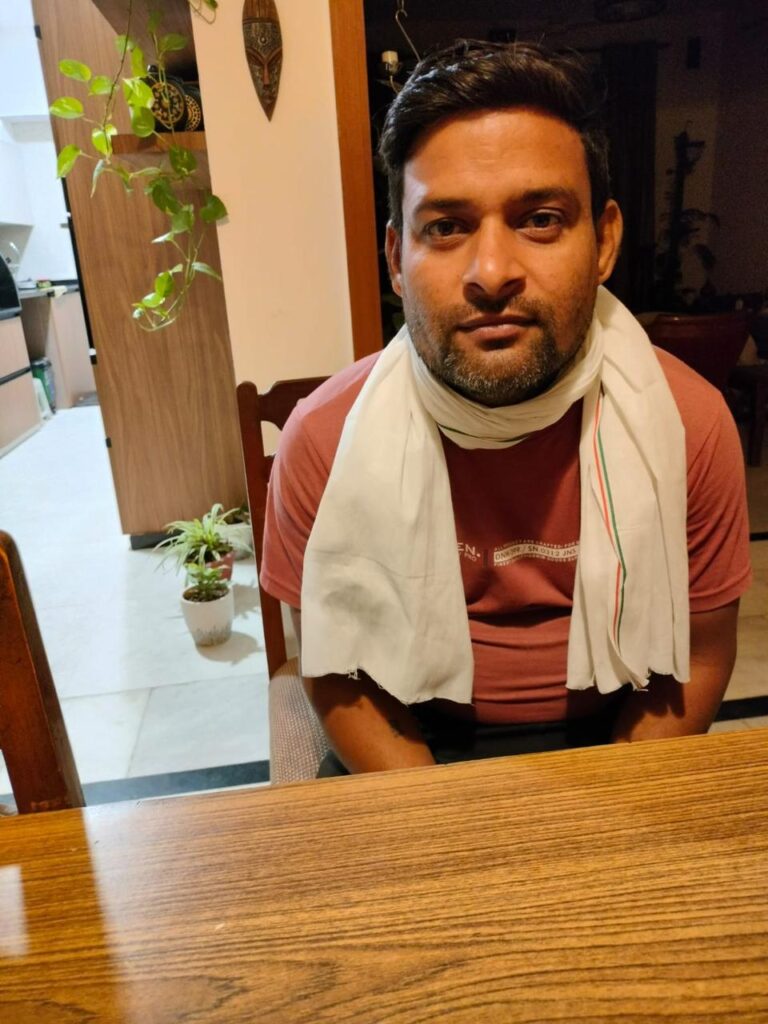Ajay Kumar a young junk collector OR a Kabadi Wala estimates his age to be around 32-35. As per his mother, It was around the days of Babri agitation that he was born.
“All Kabadiwallas are traders and are attached to a wholesaler who buys the entire stuff picked up by us, which he stores in his godown and sells it further down. Whereas the wholesaler has a fixed price at which we sell it to him, on our side, we have the liberty to ourselves decide the price at which we pick up junk from the houses. People haggle, but not for long since the priority for them is to get rid of the things rotting (and occupying space) in their houses. “We do not earn any salary – The difference between the price at which we buy and the one at which we sell is our earning of the day.” he says. “The more we pick up, the more we sell and, hence, the more the profit” says he with a smile. We’re sure about getting money the moment we drop our stuff at the wholesaler… Our dealings are in hard cash and I keep account of all my transactions”
“Our earnings are erratic. We too have ups, downs, premium days and very good seasons. Weekends, when people look at their backyards and want to do a bit of spring cleaning, prove to be better days for our business usually, otherwise, the festivals and the festive season before and after Diwali, plus the Christmas and new years’ have always been bumper periods for us. People throw away a lot of stuff when they are getting their houses repainted so we keep an eye on such opportunities as well.”
Ajay has worked hard and has proved himself to be a good resource for his wholesaler who’s awarded him a small electric truck, making it convenient for him to carry stuff, which, at times, is bulky and rather heavy. The wholesaler has the licence to operate in a colony, which, according to Ajay, costs him a phenomenal amount. “We have our own, strictly demarcated areas and we are not allowed to transgress in any circumstance”
Before this, he used to operate in the Sarojini Nagar market, New Delhi, where he used to sell socks, handkerchiefs, scarves, clips, combs, and small stuff, carrying it on a stand hung on his shoulders. “I’m quite used to selling while being on the move and, see, I’m still operating the same way”
Ajay has one sister and one brother and he’s the youngest. He started his work during the lock-down and his brother also deals in the Kabari stuff with the same wholesaler, who has employed about 18 to 20 boys like him. “These days I start my day at 8 am and even earlier during the summer days and there is no fixed day for a holiday. I get packed lunch from home and I eat whenever I get the time. I have two school-going children and my wife stitches clothes for people and we are fortunate to live in a small house of our own”
Over the years our operations have become difficult – we are not allowed to use loudspeakers nor can we make loud vocal calls for our kabadi stuff. People haggle a lot, even for 10 extra rupees, which, at times is very annoying for us as we are doing all this only to help people clear out their mess.
Popular Stories
How To Revive Your Rainwater Harvesting System
The Water Couple’s Journey: From Cleaning Tanks to Complete Water Solutions!
Locals Felling Trees Near Sec A Pkt C
Winning Has Become a Habit for Divya
Is Green Park Heading Towards A Slum
Haphazard Parking, Narrow Walking Space In M Block Market
Recent Stories from Nearby
- Water Wastage: A NegligenceWe Can No Longer Ignore April 4, 2025
- Residents Take Up Empty Plot Cleaning & Installation of Composting Pits April 4, 2025
- AIKGA Holds 58th Fruit, Vegetableand Flower Show (2025) April 4, 2025
- Reckless Driving: Norm Of The Day April 4, 2025
- Updates from AIKGA Unit 42 April 4, 2025








